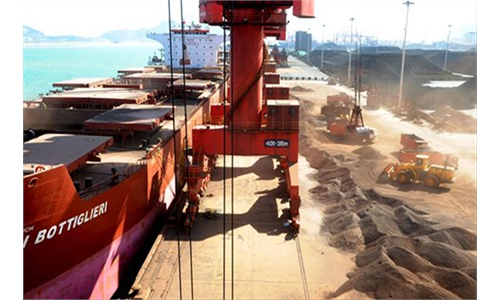
Illustration: Chen Xia/Global Times
Global semiconductor giant TSMC was expected to get a share price boost from its second-quarter results, which were stronger than anticipated. Instead, the shares sank in Taiwan island and the US, sending a warning for the company and underscoring the growing disruptive impact of US geopolitical pressure on the stability of the world's semiconductor industry chain.
Shares of TSMC listed on the Taiwan Stock Exchange continued their decline from last week, falling 3.2 percent on Monday. The New York-listed shares fell by 3.55 percent on Friday, resulting in an overall decrease of 11.52 percent last week.
TSMC reported strong second-quarter results on Thursday and lifted its guidance for investors. Second-quarter net revenue rose by 40.1 percent year-on-year, and net income increased by 36.3 percent.
But even this robust performance couldn't alleviate investors' concerns about escalating geopolitical tensions caused by the US. The tightening of US policies toward China, especially restrictions on the chip sector, has become a source of risks and uncertainties.
For instance, the Biden administration is said to be considering implementing stricter restrictions on semiconductor technology exports, a new measure called the foreign direct product rule, which will allow the country to impose controls on foreign-made products that use even the tiniest amount of American technology, according to a Bloomberg report last week.
The measure targeting China is designed to clamp down on semiconductor trade between other countries and China, thereby squeezing China in the global semiconductor industry chain and restraining China's development in artificial intelligence technology and high-end manufacturing.
TSMC is not the only semiconductor company whose shares have plunged in recent days. ASML, AMD and Nvidia all fell last week. The declines in semiconductor companies' prices reflect recent political shocks facing global industries.
The market response could be a concerning indication of the disruption that Washington's irresponsible policies have inflicted on the global economy. Sanctions and restrictions imposed by the US on Chinese companies, although seemingly aimed at suppressing China only, have set off a ripple effect worldwide, resulting in far-reaching consequences for the global economy.
The unpredictability and hazards associated with these policies present obstacles for Chinese companies and have substantial ramifications for multinational corporations.
As geopolitical tensions escalate, there could be a redirection of international capital toward the US, potentially benefiting American companies in the short term. However, the long-term implications of political risks may ultimately weaken their profitability, as this uncertainty affects companies' investment strategies and erodes market confidence.
A complete shift of the global market toward US manufacturing is unlikely to materialize. Instead, certain sectors may witness companies seeking new partnership to explore alternative routes that bypass the US market, resulting in a fresh wave of intense competition against the US.
Multinational corporations caught in the crossfire may seek more independent development paths, creating opportunities for China to break through US containment through cooperation.
Furthermore, geopolitical efforts by the US to undermine China's competitiveness are being complicated by the interconnected nature of global industrial and supply chains. Businesses deeply entrenched in the Chinese market and its innovation, as well as those vital to the worldwide supply chain, could face the consequences of these measures. The repercussions go beyond just the economy, potentially hindering global progress in technology and innovation.
These negative outcomes are becoming increasingly evident these days, and even American companies will eventually be unable to escape their effects.



